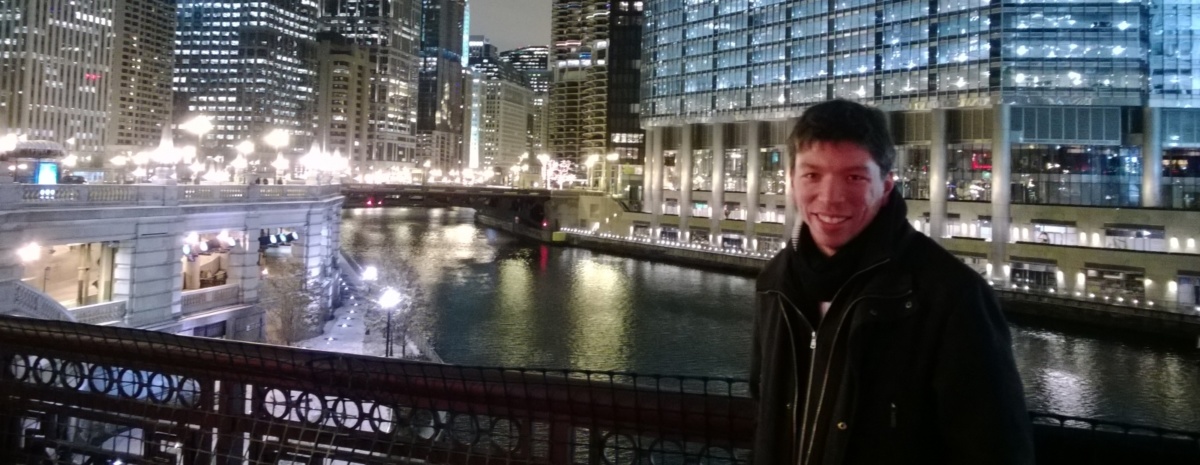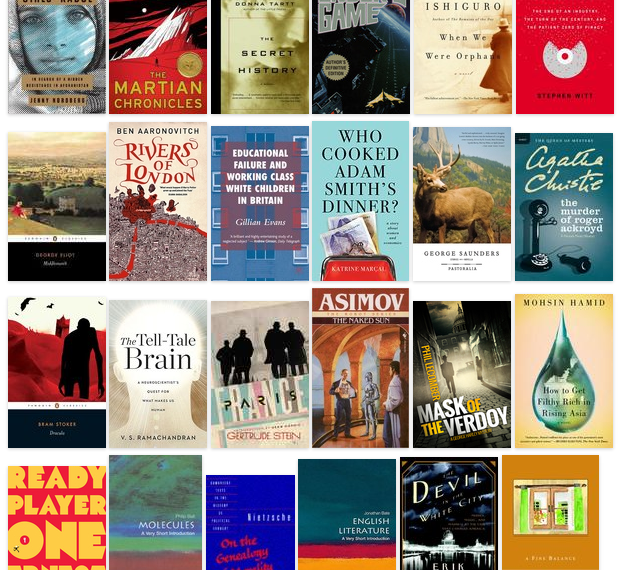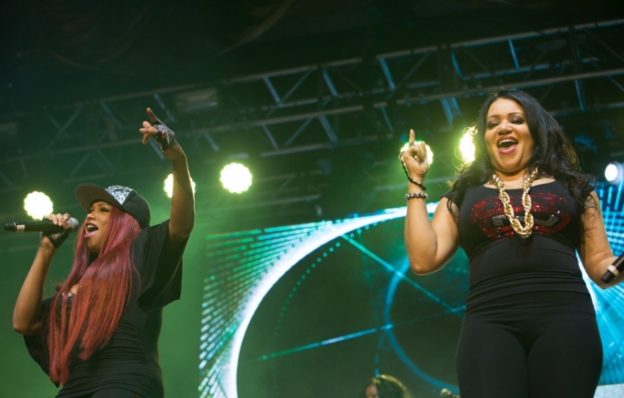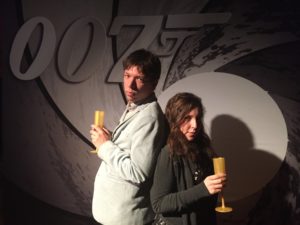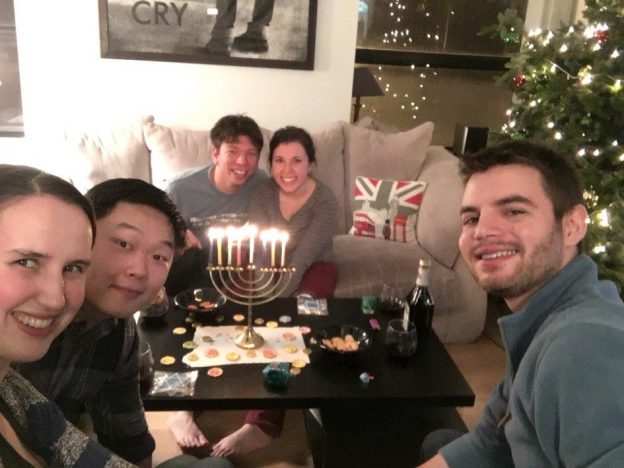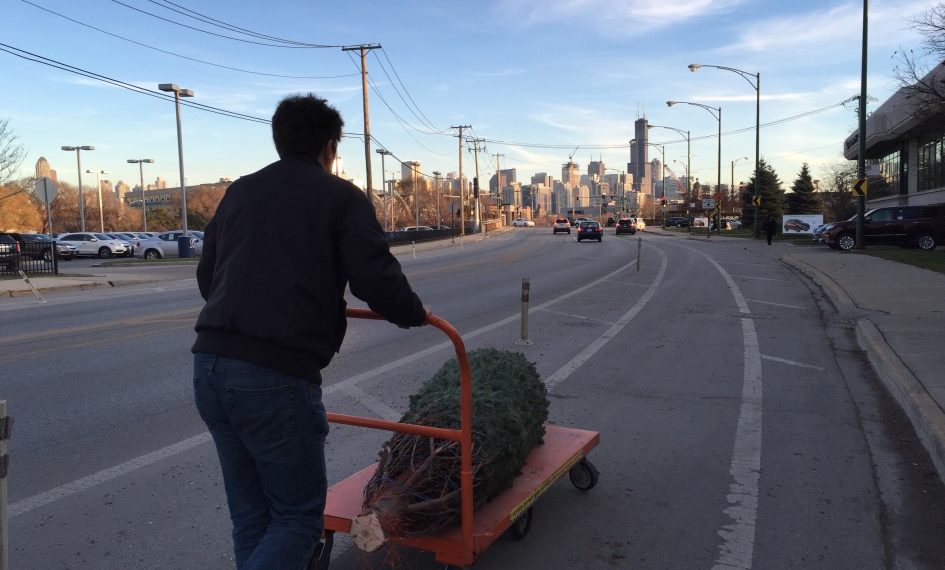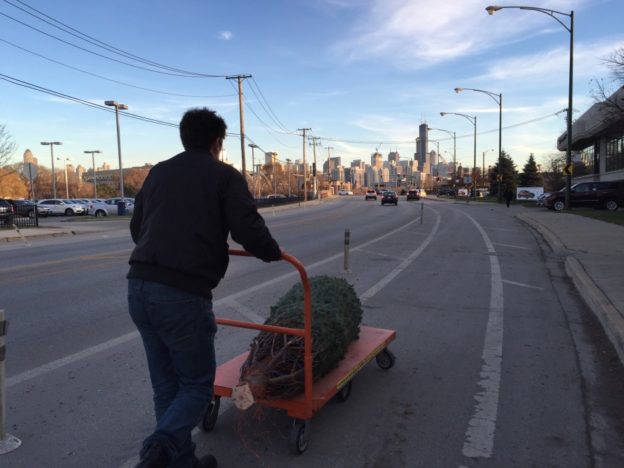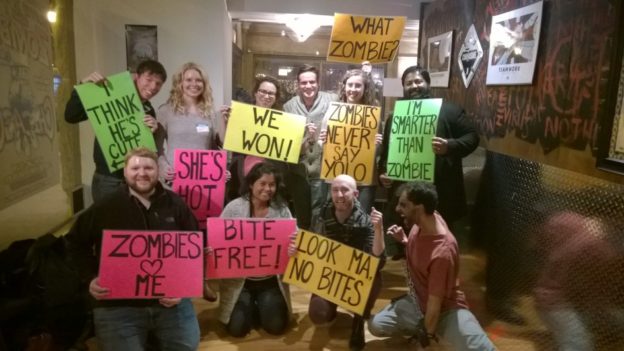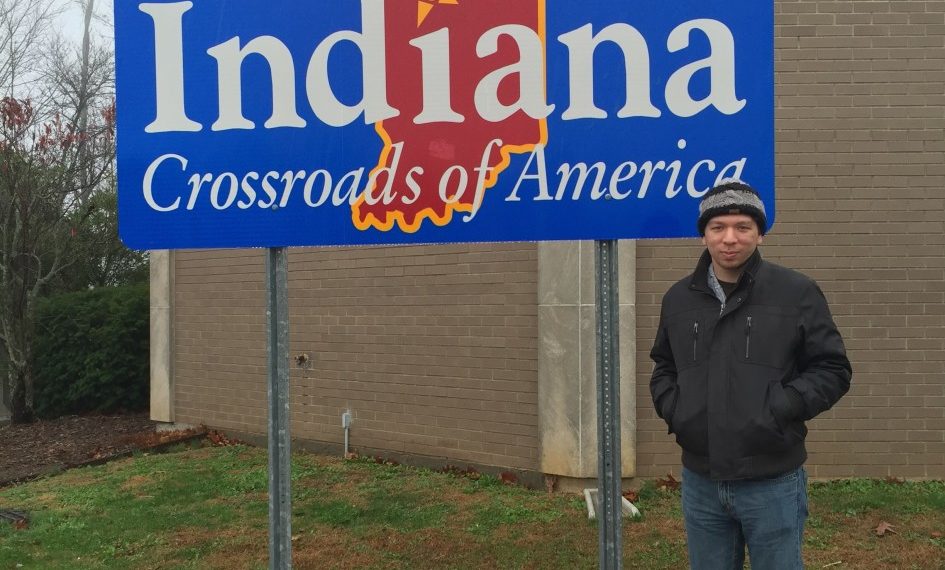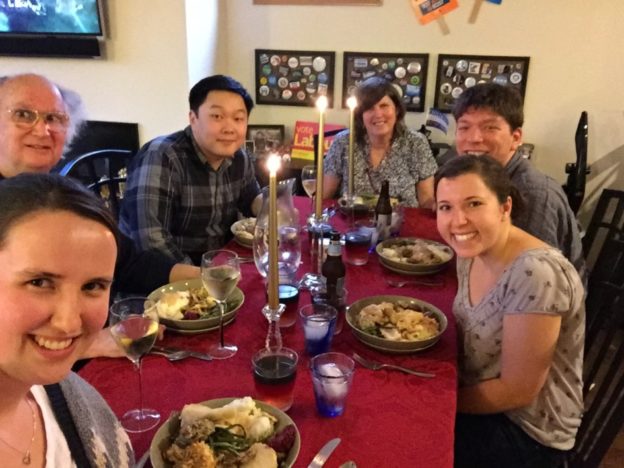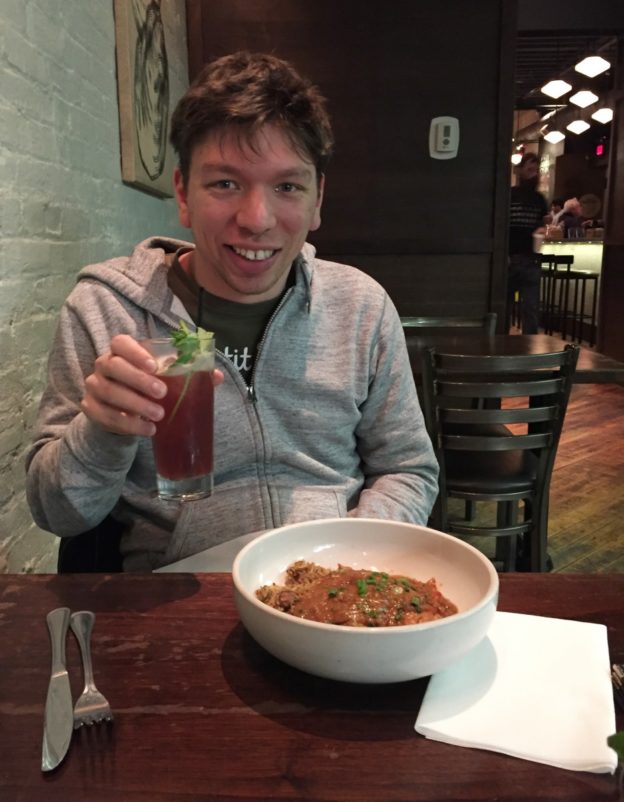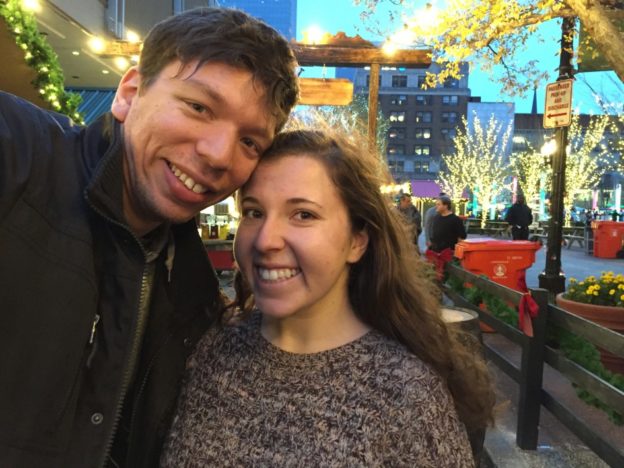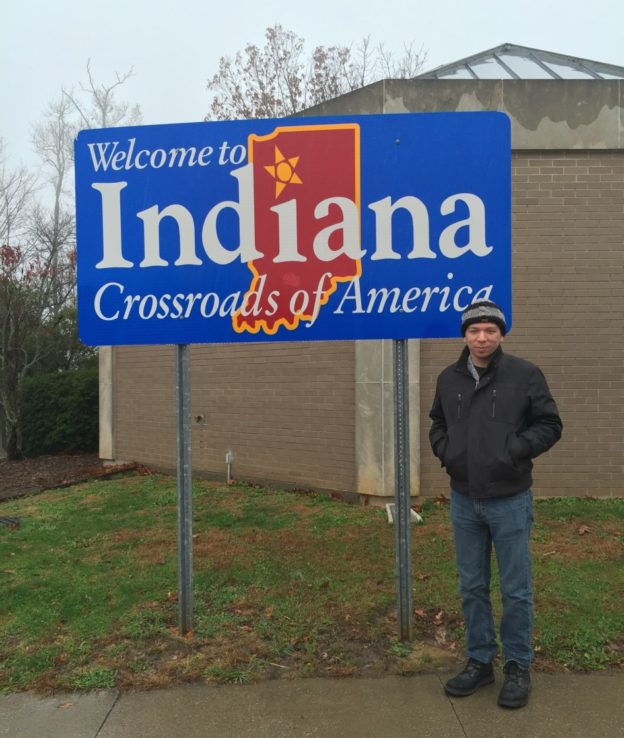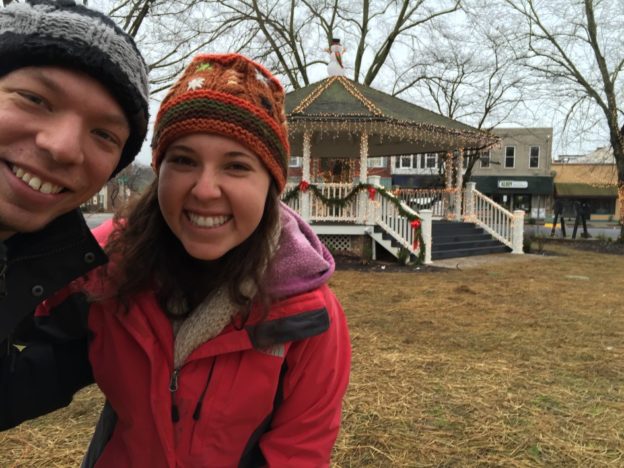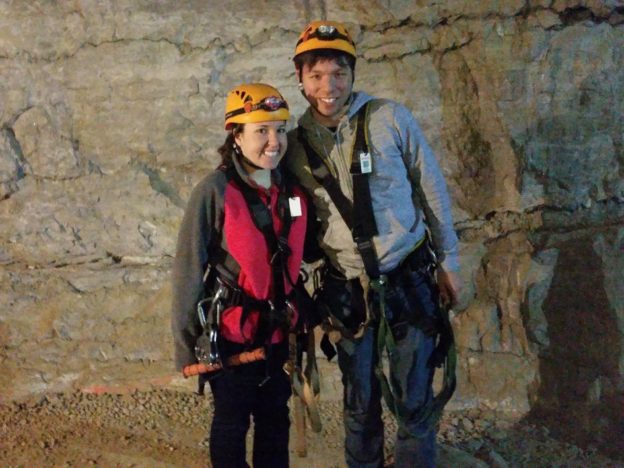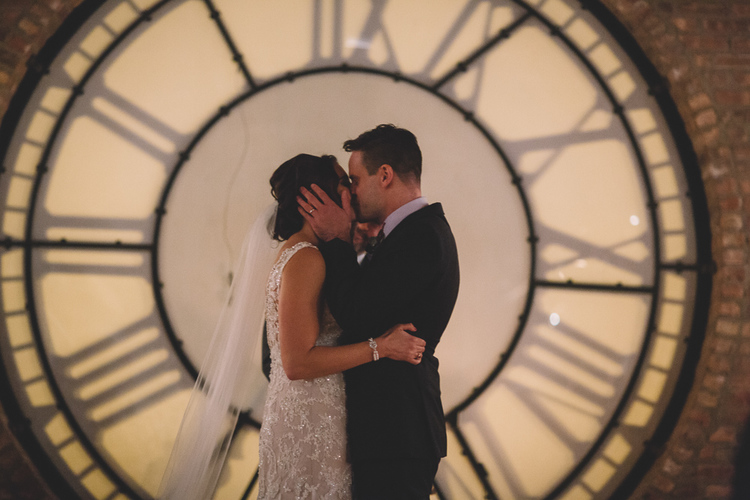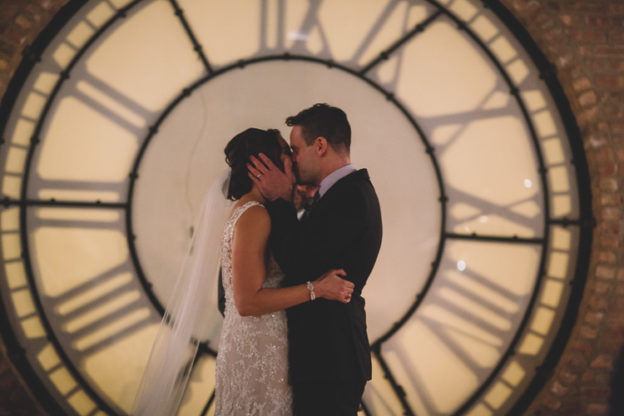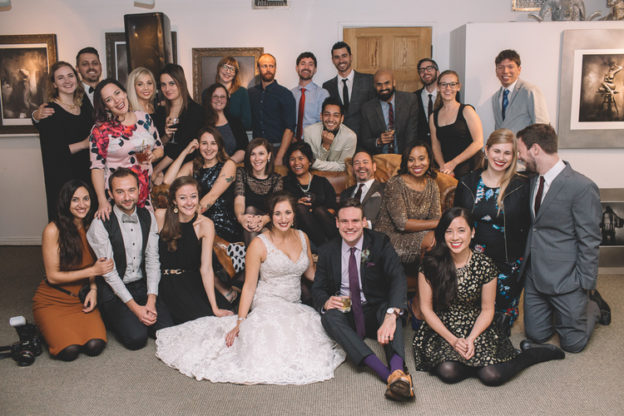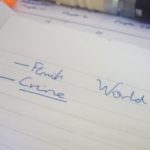After a dip in 2014, this year I returned to my upward curve for number of books read. And yes, while caring about the raw number is silly, it’s also a good motivator to do something I really enjoy but otherwise struggle to make time for. And I read some great things in 2015…
I’ve seen plenty of interesting authors interviewed about their books on The Daily Show over the years, but I rarely manage to follow-up by reading them. Something about Bryan Stevenson was compelling enough to buck this trend, and his account of working as a lawyer to overturn horrendous miscarriages of justice in the American South – Just Mercy – was one of the most powerful and important things I read this year. It’s about a whole lot more than the death penalty, but the image of a prison officer strapping a defenceless human being into a chair and executing him – at the behest of the state – is one of the most jarring and frightening intrusions of barbarism into the modern world I can imagine. I think there is validity to the argument that we over-praise democracy and under-appreciate the rule of law, and in a world where entirely innocent people can be arrested, convicted, imprisoned and killed, both are denied.
Another Daily Show recommendation was The Underground Girls of Kabul, which tells the fascinating story of bacha posh: girls raised as boys, at least until adolescence, for both ‘luck’ and raw practicality in cultures where being born female is so bad it can make your mother weep. A useful reminder both of the constructed nature of gender, and the hidden adaptations and compromises which ‘real people’ always make below the surface of a society. Another book about being born in the wrong place at the wrong time was the classic There Are No Children Here (a gift from Robert) which follows two young boys growing up in Chicago’s prison of poverty and violence. It’s really not far away. And in turn, Educational Failure and White Working Class Children in Britain (Tash’s recommendation from years ago) well articulates social class in Britain, which can be hard to explain to people here.
On a more upbeat note, Rivers of London – recommended by Diamond Geezer a few times on his blog – was a rough but promising Gaiman-esque urban fantasy, and sets up an intriguing series to follow. Ready Player One was even more fun: a page-turning young adult adventure which appealed to someone with only conversational fluency in 1980s pop culture. It certainly left me more uplifted than the similar Ender’s Game, which others feel passionately about, and is a good read but also surprisingly chilling and sad. I am a little intrigued to see what happens next, but I won’t be rushing. It’s the same story with Mark of the Verdoy, which attempts to kick off a series of 1930s London detective stories, but wears its amateur historian heart a little too closely on its sleeve. (Please don’t put dialogue into Ramsay MacDonald’s mouth unless you really know what you’re dong.)
A few books were return visits to worlds from previous years. I’ve loved all of JK Rowling’s Cormoran Strike series, but the third entry – Career of Evil – improved on its predecessors with a satisfying ending to the murder plot as well as the usual enjoyment of being among Robin and Strike. In the same vein, I very much enjoyed Agatha Christie’s fiendishly clever ending to The Murder of Roger Ackroyd. Something Fresh was my first non-Jeeves PG Wodehouse book, and while it didn’t make me laugh quite as much, I will certainly be back for more. Asimov’s The Naked Sun, the second in his Robot series, was better than the first and sketched a memorable portrait of an elite society with a crippling phobia of human contact. My other classic sci-fi of the year, Ray Bradbury’s collection of short interlinked stories The Martian Chronicles (thanks, Katie!), was also wonderfully alien and spooky. I’ll be back for more of him, too.
I had put off reading Dracula for years, but it was surprisingly fluid and gripping, at least for most of the way through. The much-discussed ‘undertones’ of Victorian sexual fears are not so much undertones as raw panic – at one point sweet, wholesome Mina is forced to her knees to suck Dracula’s blood out from his chest while her humiliated husband lies unconscious – but you didn’t expect today’s mores from the granddaddy of nineteenth century Gothic horror, did you? At least Mina has a pretty happy relationship when she’s not being drained to death. The experience of Dorothea in Middlemarch, by contrast, is a sad reminder of the Victorian ‘cross your fingers and hope for the best’ approach to marriage for women. I was more enthralled than I expected to be by George Eliot’s long but well-paced classic on provincial life. And then every so often I would pause to give sincere thanks for dating and contraception.
This year I also got around to Crime and Punishment. No doubt Dostoevsky is masterful at getting under the skin of his jumpy and degenerating protagonist, Raskolnikov, but he also hits you in the face with Christian salvation a little too much for my liking. And most of said salvation is delivered by poor Sonya, who becomes inexplicably devoted to her best friend’s murderer. (She’s a prostitute, so her devotion to others is supposed to act as her own redemption, except today it’s hard to conjure up any feelings of condemnation and so she becomes purely a martyr.)
Two American novels which Robert and Todd both suggested – Jonathan Franzen’s Freedom and Donna Tartt’s The Secret History – were both great. The Secret History is the greater of the two, I think, mostly because I was successfully ensnared into mentally egging on the murder before being dumped with real feelings of horror and guilt afterwards. Freedom has become hazier in my mind over the year, although I do remember thinking it shared a literary style with Zadie Smith. And Pastoralia, George Saunders’s collection of brisk (and often weird) short stories satirising modern life, was another recommendation (thanks, Katie Schuering!) I will gladly pass on to others. Gertrude Stein’s Paris France was also odd but breezy: like going to lunch at a café with an eccentric aunt, whose observations on life are mostly ludicrous but pleasant enough to listen to for a bit. On the other hand, The Fortress of Solitude – a Brooklyn-based coming-of-age story – was more of a slog.
In the late nineteenth century, in Chicago, Herman Webster Mudgett built a hotel to host visitors to the Chicago World’s Fair. The ‘castle’ took up an entire block and was designed to be as confusing as possible: a maze of rooms at odd angles with staircases leading to nowhere and doors which could only be opened from one side. The whole point was to allow Mudgett, also known as H.H. Holmes, to murder young women who visited from out of town, several of whom he married first. The story of H.H. Holmes is, without doubt, the only reason anyone ever picks up The Devil In The White City. That it is intertwined with a moderately-interesting account of the design and construction of the World’s Fair itself will be either a pleasant surprise or an annoying deviation, depending on taste.
Some short takes: When We Were Orphans is no one’s favourite Ishiguro novel (least of all his) and threw me into a bit of a funk when reading it, but a bad Ishiguro book is still a pretty good book. Who Cooked Adam Smith’s Dinner? (answer: his unpaid mother) is a witty, feminist critique of homo economicus. I suspect the author would appreciate the themes of maternal self-sacrifice in Please Look After Mom, partly notable for being written in the second person. I chose The Tell-Tale Brain as a follow-up to Phantoms of the Brain, which I read years ago, and if you decide to join me you will spend days trying to shoehorn interesting neurological studies into unrelated conversations. I’ve read numerous variations of the Asian rags-to-riches-to-rags story which is told in How To Get Filthy Rich In Rising Asia, but this is a good and moving one. A Fine Balance, set during India’s ‘Emergency’ period of the mid-1970s, is a more demanding read but also a beautiful, sad story with wonderful and memorable characters. I grew very attached.
Finally, while it’s a terrible cliché to enjoy Nietzsche, it is very hard not to. He’s sharp and insightful, weaving a great historical narrative out of clever linguistic details (e.g. what is ‘good/evil’, and how does it differ from ‘good/bad’?) and, when he gets worked up, he can hold one hell of a shouting match with himself. One thing Nietzsche can’t do, however, is hold a candle to George Orwell. And so I want to conclude this lengthy review with praise for him, who can be enjoyed in Penguin’s collection of essays. Orwell possessed such a wise, prophetic and independent voice that he is admired and respected – without misrepresentation – by both the left and the right. But you should know, if you’ve only read his famous novels, that Orwell does a marvellous line in cultural history. He cares about comic books, murder mysteries and cooking – and he cares about how, and why, they change over time. He understands patriotism, understands how people think and behave (just read, for example, his description of which books are borrowed from libraries versus which books are bought from bookshops) and he does it in the finest, clearest prose. For Orwell, good writing is a political act, and he makes me feel illiterate. I wish he were still around to consult.
There’s maybe a 50/50 chance I have seen The Merry Wives of Windsor. I have some memory of doing so, but it’s also quite possible I dreamt it, and there’s no record on this blog. If I did, it didn’t leave me with an abiding appreciation for Sir John Falstaff, which is a shame because Sir John is a great comic character: the fat, drunken, cowardly knight who is subject to endless practical jokes. (Originally the character was called John Oldcastle, but then one of his descendants complained, forcing Shakespeare to change the name and add an epilogue promising that any resemblance to real persons, living or dead, was purely coincidental.)
I bring this up in gratitude to Marti for inviting us to the Backroom Shakespeare Project’s take on Henry IV (Parts 1 and 2 mashed together) which, as the name suggests, takes place in a relaxed setting at the back of a pub and finally got me properly acquainted with Sir John. Chatting and wandering about among the audience is encouraged – which explains how I was able to scan Wikipedia for so many facts while trying to follow along with the plot – as is improvisation and levity up on stage. The result is a performance which simultaneously diverges from the original (I’m pretty sure Prince Hal didn’t always steal cheeseburgers) and more authentically recreates the rowdy and boisterous atmosphere of actual Elizabethan theatre. (I’m not a time-traveller, so I’m trusting in what we were taught in GCSE English.)
On the theme of authentic recreations, I should mention Star Wars: The Force Awakens which I saw with Randi, Nolan, Todd and Carolyn on Saturday. As a group, we ranged from “Star Wars was the most perfect movie from my childhood” to “I’ve never seen Star Wars before”, so it must be a good sign that everyone enjoyed themselves, and were still talking about it at Robert and Julie’s leaving party later that night. J.J. Abrams certainly has a gift for taking a tired old franchise and making it fun again. [Insert joke about taking on the presidential debates here. Seriously, though, they are not even fun anymore. Karol can attest to this.]
Other things: I fulfilled a life’s ambition I didn’t even know I had by seeing Salt-N-Pepa perform at Groupon’s 007-themed holiday party. It was especially nice to prelude this year’s party with a game of drinking Jenga at Todd’s. And speaking of drinking games, for Hanukkah we came up with an inspired game of dreidel which included shouts of “power gimel!” (two in a row) and then Hanukkah transfer tattoos.
Necessary alcohol (and it sure was necessary) was provided by Nisreen’s lightning-fast Bundle Club company, and in turn this reminded me that I hadn’t seen Nisreen in far too long, so we followed-up with a lunch to set the world to rights.
It’s a mahoosive one this year:
And the whole way home I was terrified of being arrested and/or deported and/or shot and killed for ‘borrowing’ the cart. But it was totally worth it.
In other news, I was finally part of an escape room team which actually escaped a room! And a room menaced by a zombie, no less.
In the run-up to Thanksgiving I had a couple of fun evenings: a movie salon at Robert and Julie’s examining The Breakfast Club (and its atrocious ending), a horror-themed Escape the Room-style adventure for Constance’s birthday – better characterised as a we-came-nowhere-close-to-actually-escaping-the-room style adventure – and an old-fashioned evening of chatter at Motel with Sean and Dre. And then, Thanksgiving itself!
One of the many great things about Thanksgiving is that I have no childhood vision of what it should be like, unlike Christmas, which is not really Christmas without presents under the tree / Christmas crackers / a family argument before sitting down to watch Doctor Who at midnight and so on. My only traditions so far are great food, great company and giving thanks for things, and I got all of this again at Catherine and Jason’s this year. It was such an enjoyable afternoon, and a total pleasure to meet Catherine’s parents and play Fibbage against them. Plus, all of the food turned out so well. And there was rhubarb pie!
For the rest of the long weekend, Randi and I went exploring two more roadtripable states. Our first destination was Louisville, Kentucky which was holding its annual Light Up Louisville celebration. This included music (carols, churchy stuff, colour-coordinated children), some appealing German market touches (especially currywurst, mulled wine) and a full-on holiday parade, which was narrated by two unnervingly peppy stars of local radio. It was also accompanied by a fair amount of rain, which made it rather difficult to capture in all of its glory, but didn’t actually detract from the city spirit.
The next day, we left our B&B (a B&B which, it must be noted, surprised us with free slices of piecaken) and headed back north for a night in Indiana.
I feel a little bad for Indiana. By broad consensus, its sole purpose is to plug an otherwise awkward-looking gap between neighbouring states. And no doubt, the view from the interstate – endless warehouses selling fireworks plus a giant billboard bearing the sophisticated slogan that ‘HELL IS REAL’ – doesn’t inspire a lot of confidence. So instead of searching for a mediocre city, we sought out small-town charm in Corydon, who were throwing their own Christmas lights switch-on bash for the town’s roughly 3000 residents.
It’s a little odd, actually, since tiny Corydon started out as the capital of Indiana when it acquired statehood in 1816. The original constitution even states that the town “shall be the seat of Government of the state of Indiana, until the year eighteen hundred and twenty-five, and until removed by law”. But come 1825, the provision ran out and the capital immediately shifted to Indianapolis, leaving behind a small but charming community where the local chemist is called Butt Drugs, the local café serves up the best chips I’ve had in ages, and bells very confusingly ring out tunes from Oklahoma on the hour.
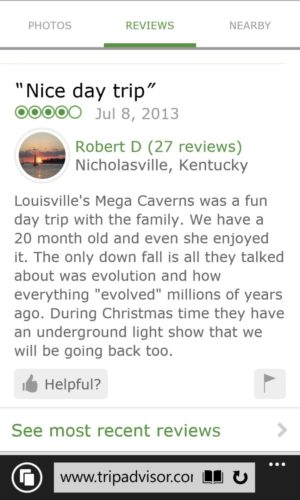
The lies of limestone
And that would be that, had it not been for all the roadside advertisements we passed for underground ziplining at Louisville’s Mega Cavern. Having never been ziplining before, it sounded amazing, and my mind was made up after checking TripAdvisor and learning that even those who believe it’s an outrage against God still gave it 4 out of 5 stars.
So back we went to Kentucky, and down an old limestone mine, to whizz through caves on ropes and wires. It was a strange mixture of adrenaline rush and quiet beauty, and if you do ever find yourself taking a roadtrip around this part of the way, you should check it out.
Final word of the trip must go to Todd, for recommending Yats in Indianapolis, our final stop on the way home to Chicago. It serves New Orleans-style food, and it’s amazing. Enough said.
I have this Modest Proposal for fixing the US drinking age. 21 is well above the international norm of 18 for legally purchasing alcohol – although it turns out to be 25 in some parts of India, who knew? – and the usual justification is that drinking and driving is a bad idea. Drinking and driving is a terrible idea, no doubt, so why not go one further and allow 18-21 year olds to choose? You could either register for a driving licence, or a drinking licence, but not both. They’d be different colours. For those who need to drive, it would be status quo. For those who don’t, they could sign away the risk and, in return, no longer have to confine their drinking to dodgy college parties. It’s win-win, except for the conveners of dodgy college parties.
I put this idea to Will Guzzardi, a State Representative for Illinois, at a fundraising thing hosted by 270 Strategies, but he didn’t seem to think it was a priority. And given that the Republican governor of Illinois is among those indulging in brazenly racist rabble-rousing against Syrian refugees this week, maybe he has a point.
As always, a powerful counterweight to such baseness is the joy and love of good people. This was no better demonstrated than at Robert and Julie’s wedding. They are both such wonderful people, and it’s impossible not to be happy at how happy they are. To make things even better, Katie and Brandon were in town for it, and I realised how much I missed Katie’s facial expressions.
Pictures below are borrowed (with permission) from Stephanie Bassos Photography, who will make you want to get married just so you can have some of your own.
Other than that, I’ve mostly been planning Thanksgiving / Christmas / post-Christmas-but-it’s-still-cold getaways. Randi and I did see Chapter Two last night, a play which felt very much from another time and place, which is good because it actually was (New York, 1977). There was a somewhat jarring switch from light-hearted dad-jokes in the first half to an outpouring of emotion in the second – a situation of the main characters’ own making, since they decided (for unclear reasons) that they had to get married in a week. Unless their wedding photographer was leaving the country, I couldn’t relate.
